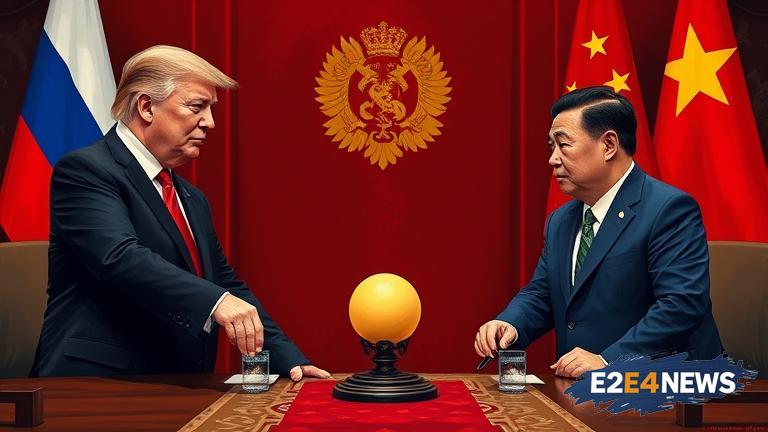In a recent development, the US President has renewed his efforts to engage in denuclearization talks with Russia and China. This move is seen as a significant step towards reducing global nuclear threats and promoting international security. The President’s administration has been actively seeking to revive diplomatic efforts with the two nations, with the goal of achieving a comprehensive and verifiable denuclearization agreement. The talks are expected to focus on a range of issues, including nuclear disarmament, non-proliferation, and arms control. The US President has emphasized the importance of cooperation between the three nations in addressing the growing nuclear threats posed by North Korea and other rogue states. Russia and China have also expressed their willingness to engage in talks, with the Russian President stating that his country is committed to reducing its nuclear arsenal and promoting international security. The Chinese government has also reiterated its commitment to denuclearization, citing the need for a peaceful and stable international environment. The renewed push for talks comes amid growing concerns over the escalating nuclear arms race between the US, Russia, and China. The three nations have been engaged in a series of diplomatic efforts in recent years, including the Strategic Arms Reduction Treaty (START) and the Intermediate-Range Nuclear Forces Treaty (INF). However, the talks have been hindered by disagreements over issues such as missile defense and nuclear modernization. Despite these challenges, the US President remains optimistic about the prospects for a successful agreement, citing the shared interests of the three nations in reducing nuclear threats and promoting international security. The talks are expected to be complex and challenging, requiring significant compromises and concessions from all parties involved. However, the potential benefits of a successful agreement are substantial, including a reduction in the risk of nuclear conflict and the promotion of a more stable and secure international environment. The US President’s renewed push for talks has been welcomed by international leaders and experts, who see it as a critical step towards addressing the growing nuclear threats facing the world. The European Union has expressed its support for the talks, citing the need for a comprehensive and verifiable denuclearization agreement. The United Nations has also welcomed the renewed push for talks, emphasizing the importance of cooperation and diplomacy in addressing global security challenges. As the talks move forward, the international community will be watching closely, hoping for a successful outcome that promotes peace, stability, and security. The US President’s commitment to denuclearization has been a key aspect of his foreign policy agenda, with the goal of reducing the risk of nuclear conflict and promoting international security. The renewed push for talks with Russia and China is seen as a critical step towards achieving this goal, and the international community will be closely monitoring the progress of the negotiations. The talks are expected to be a long and challenging process, requiring significant diplomatic efforts and compromises from all parties involved. However, the potential benefits of a successful agreement are substantial, and the international community remains hopeful that the talks will lead to a more stable and secure world. The US President’s administration has been working closely with international partners to build support for the talks, including the European Union, the United Nations, and other key stakeholders. The renewed push for talks has also been welcomed by civil society organizations and advocacy groups, who see it as a critical step towards reducing the risk of nuclear conflict and promoting international security. As the talks move forward, the international community will be watching closely, hoping for a successful outcome that promotes peace, stability, and security. The US President’s commitment to denuclearization has been a key aspect of his foreign policy agenda, and the renewed push for talks with Russia and China is seen as a critical step towards achieving this goal.
Sun. Nov 2nd, 2025
